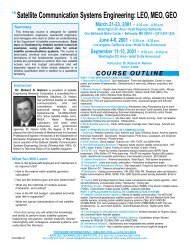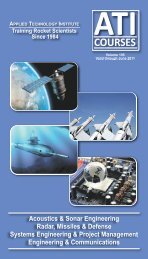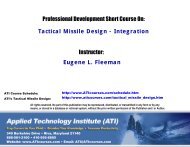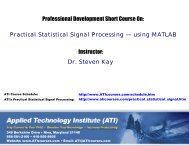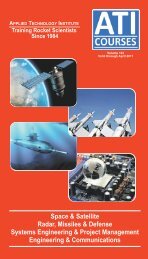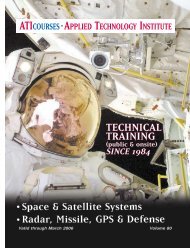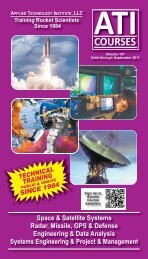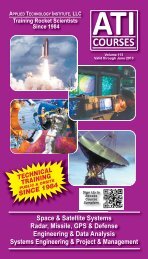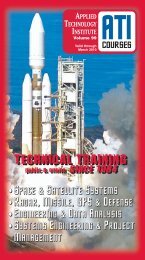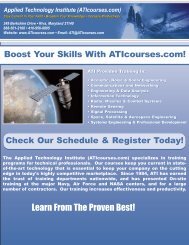Download - Applied Technology Institute
Download - Applied Technology Institute
Download - Applied Technology Institute
- No tags were found...
Create successful ePaper yourself
Turn your PDF publications into a flip-book with our unique Google optimized e-Paper software.
Certified Systems Engineering Professional - CSEP PreparationGuaranteed Training to Pass the CSEP Certification Exam Course # M144October 17-18, 2014Chantilly, VirginiaJanuary 12-13, 2015Dayton, OhioFebruary 24-25, 2015Albuquerque, New Mexico$1290 (8:30am - 4:30pm)Register 3 or More & Receive $100 00 EachOff The Course Tuition.Video!www.aticourses.com/CSEP_preparation.htmSummaryThis two-day ( or three-day live instructor lead virtual online)course walks through the CSEP requirements and the INCOSEHandbook Version 3.2.2 to cover all topics on the CSEP exam.Interactive work, study plans, and sample examination questionshelp you to prepare effectively for the exam. Participants leavethe course with solid knowledge, a hard copy of the INCOSEHandbook, study plans, and three sample examinations.Attend the CSEP course to learn what you need. Follow thestudy plan to seal in the knowledge. Use the sample exam to testyourself and check your readiness. Contact our instructor forquestions if needed. Then take the exam. If you do not pass, youcan retake the course at no cost.InstructorsDr. Eric Honour, CSEP, international consultant andlecturer, has a 40-year career of complexsystems development & operation. FormerPresident of INCOSE, selected as Fellow andas Founder. He has led the development of18 major systems, including the Air CombatManeuvering Instrumentation systems andthe Battle Group Passive Horizon ExtensionSystem. BSSE (Systems Engineering), USNaval Academy; MSEE, Naval PostgraduateSchool; and PhD, University of South Australia.Mr. William "Bill" Fournier is Senior Software SystemsEngineering with 30 years experience the last11 for a Defense Contractor. Mr. Fourniertaught DoD Systems Engineering full time forover three years at DSMC/DAU as aProfessor of Engineering Management. Mr.Fournier has taught Systems Engineering atleast part time for more than the last 20years. Mr. Fournier holds a MBA and BSIndustrial Engineering / Operations Researchand is DOORS trained. He is a certified CSEP, CSEP DoDAcquisition, and PMP. He is a contributor to DAU / DSMC,Major Defense Contractor internal Systems EngineeringCourses and Process, and INCOSE publications.What You Will Learn• How to pass the CSEP examination!• Details of the INCOSE Handbook, the source for theexam.• Your own strengths and weaknesses, to target yourstudy.• The key processes and definitions in the INCOSElanguage of the exam.• How to tailor the INCOSE processes.• Five rules for test-taking.Course Outline1. Introduction. What is the CSEP and what are therequirements to obtain it? Terms and definitions. Basis ofthe examination. Study plans and sample examinationquestions and how to use them. Plan for the course.Introduction to the INCOSE Handbook. Self-assessmentquiz. Filling out the CSEP application.2. Systems Engineering and Life Cycles. Definitionsand origins of systems engineering, including the latestconcepts of “systems of systems.” Hierarchy of systemterms. Value of systems engineering. Life cyclecharacteristics and stages, and the relationship ofsystems engineering to life cycles. Developmentapproaches. The INCOSE Handbook systemdevelopment examples.3. Technical Processes. The processes that take asystem from concept in the eye to operation, maintenanceand disposal. Stakeholder requirements and technicalrequirements, including concept of operations,requirements analysis, requirements definition,requirements management. Architectural design, includingfunctional analysis and allocation, system architecturesynthesis. Implementation, integration, verification,transition, validation, operation, maintenance and disposalof a system.4. Project Processes. Technical management andthe role of systems engineering in guiding a project.Project planning, including the Systems Engineering Plan(SEP), Integrated Product and Process Development(IPPD), Integrated Product Teams (IPT), and tailoringmethods. Project assessment, including TechnicalPerformance Measurement (TPM). Project control.Decision-making and trade-offs. Risk and opportunitymanagement, configuration management, informationmanagement.5. Enterprise & Agreement Processes. How todefine the need for a system, from the viewpoint ofstakeholders and the enterprise. Acquisition and supplyprocesses, including defining the need. Managing theenvironment, investment, and resources. Enterpriseenvironment management. Investment managementincluding life cycle cost analysis. Life cycle processesmanagement standard processes, and processimprovement. Resource management and qualitymanagement.6. Specialty Engineering Activities. Uniquetechnical disciplines used in the systems engineeringprocesses: integrated logistics support, electromagneticand environmental analysis, human systems integration,mass properties, modeling & simulation including thesystem modeling language (SysML), safety & hazardsanalysis, sustainment and training needs.7. After-Class Plan. Study plans and methods.Using the self-assessment to personalize your study plan.Five rules for test-taking. How to use the sampleexaminations. How to reach us after class, and what to dowhen you succeed.The INCOSE Certified Systems EngineeringProfessional (CSEP) rating is a coveted milestone inthe career of a systems engineer, demonstratingknowledge, education and experience that are of highvalue to systems organizations. This two-day courseprovides you with the detailed knowledge andpractice that you need to pass the CSEP examination.Register online at www.ATIcourses.com or call ATI at 888.501.2100 or 410.956.8805 Vol. 119 – 33



